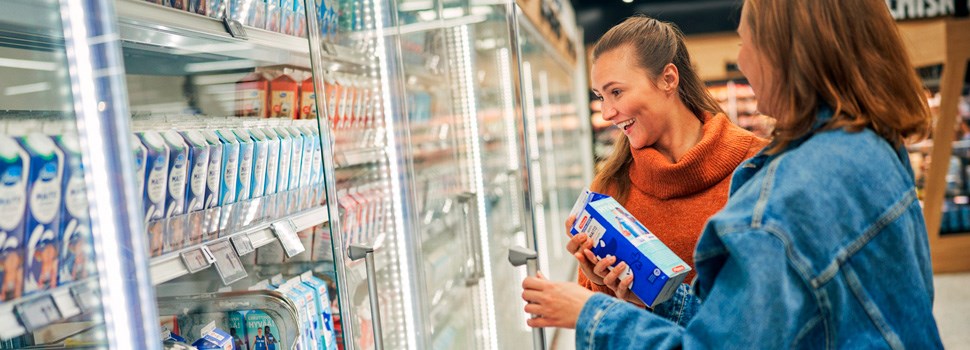
Energy efficiency

Our energy strategy aims to improve energy efficiency by 10% between 2024 and 2030. To reach this target, we need to implement energy efficiency measures totalling 95 GWh.
Waste heat recycled
Of the K Group stores, the grocery stores’ energy consumption is the highest because they need a lot of energy to safeguard the cold chain of their products. In fact, the key means of improving energy efficiency are upgrading refrigeration units and lighting, as well as new innovations, such as a heat recycling system that recycles the waste heat from refrigeration systems, and the use of analytics services that analyse energy consumption at stores.
Major energy renovations are generally carried out in conjunction with store renovations, during which K-food stores and Kespro’s wholesale outlets renovate their refrigeration units.
Our heat recycling system efficiently utilises as its energy source all the waste heat in a property, such as the condensation heat of the refrigeration system and the waste heat of exhaust air, and generates energy for all the heating and cooling systems in the property. By recycling waste heat, we generate on average about 50% of the heat demand of renovated stores.
New energy-efficient LED lighting will be installed in stores when they are renovated. Switching to LED lighting will reduce the electricity consumption of one K-Citymarket by an average of about 550 MWh, which is equivalent to the annual consumption of about 30 electrically heated detached houses. In total, the LED lighting upgrades in K-Citymarket stores have already saved around 28 GWh, which corresponds to around 15% of the chain’s electricity consumption.
Systematic measures to improve energy efficiency
To actively reduce energy consumption, K Group must make long-term investments and continuously monitor consumption and technical systems, as well as react to deviations. During our previous energy strategy period in 2018–2023, we implemented a total of almost 4,000 energy efficiency measures and achieved savings of around 115 GWh.
In 2024, we implemented energy efficiency measures totalling approximately 20.9 GWh. The most significant measures included the installation of an energy recycling system using waste heat in 20 sites, which is estimated to reduce district heat consumption by around 10 GWh.
Energy consumption
The table includes Kesko's purchased electricity, district heating and district cooling consumption, as well as its own energy production for all our operating countries.
| 2024 | 2023 | 2022 | |
| Total non-renewable energy consumption, MWh |
437,899 |
378,438 |
311,086 |
| Total renewable energy consumption, MWh |
135,872 |
176,502 |
522,746 |
| Total energy consumption, MWh |
573,770 |
554,940 |
833,832 |
Energy Management programme
The Energy Management Programme outlines Kesko's energy efficiency system. It includes descriptions of the roles, responsibilities, and timetables of the stakeholders involved in implementing energy management. Additionally, the programme describes our energy efficiency targets, the underlying energy policy, and management's commitment to improving energy efficiency.
The Energy Management programme is available here.